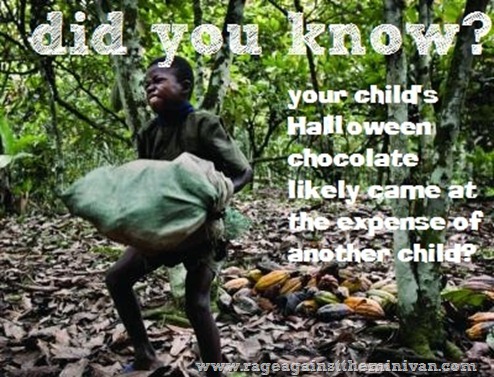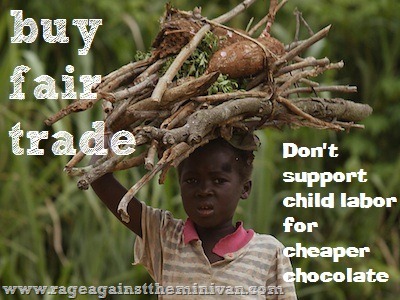
The connection between most major candy bar manufacturers and child slavery is one of the world’s best kept secrets. The US government is currently being sued by the International Labor Rights Fund for failing to enforce laws prohibiting the import of products made with child labor, and the chocolate industry has failed to meet numerous deadlines set by Congress for regulating. A few major chocolate companies have done a great job in the last year with some smoke-and-mirror campaigns . . . either offering an obscure fair-trade chocolate bar or making a show of giving to charities that support farmers. But these actions do not change the fact that they don’t want to take the necessary steps to avoid the human rights abuse of children. But honestly, what concerns me even more is that we, as consumers, are not demanding that this be stopped. People continue to buy chocolate even after learning about the harm to children in Africa. I’ve heard excuses from people in my own life that sound pretty similar to the ones I made in the coffee post. We rationalize that we can’t afford fair-trade. We joke about how addicted we are. We justify that we can’t change everything. And I think secretly, we don’t relate because these are kids in a far-off country, and not our own. It’s okay as long as we don’t have to see it happening right in front of us. 
Well, I’m here to ruin it for you. Now you know. We can’t keep looking away. If we choose willful ignorance on this one, then we are no better than the people who are directly forcing children to work. I’ve embedded a BBC documentary about this issue below. Even the first ten-minute segment is eye-opening, but the whole thing will wreck you . . . and you will be better for it. Bookmark this and watch it later. Watch it with your kids. Jafta saw this last year and despite his love of chocolate, he is the most fervent fair trade advocate I know after seeing this. Share it with your friends. Blog about it. We’re breaking up with commercial chocolate, or buying fair trade. I hope you will, too.
UPDATE:
In November of 2011, the Louisiana Municipal Police Employee’s Retirement System, a public pension fund with holdings in Hershey Co., filed a lawsuit against Hershey’s. The suit claims that Hershey’s board knew for as many as 11 years that its cocoa came from West African suppliers that used child slave labor to harvest crops. The fund accuses Hershey of ignoring domestic and foreign human trafficking laws. Whole Foods Markets announced it will stop selling Hershey’s high-end Scharffen Berger brand chocolate products over the issue of child labor. On January 31st 2012, in what was likely a response to the growing bad press about child labor practices, Hershey’s made an announcement regarding child labor in their supply line. You can read the entire statement here. In March of 2014, a Louisiana pension fund raised questions about Hershey executives’ knowledge of how much of the company’s cocoa, grown in West Africa, may have been produced by child slaves. The suit said Hershey officials refused to ensure all its West African cocoa suppliers honored international child-labor restrictions and said some retailers have voiced concerns over the company’s “failure to remedy child labor problems in the supply chain.” Again, it’s great that Hershey’s is creating a fair-trade line, but why not apply this standard to all of their products? Fair trade shouldn’t be a specialty item, and many international rights groups are still skeptical. You can read more about that here. Now let’s look at the strides Nestle has made:
Nestle announced they were submitting to a study by the Fair Labor Association to determine if child labor actually did exist in their supply chain. This was a bit of a PR move since Nestle signed the Harkin Engel Protocol and vowed to remedy the child labor issues in their company over ten years ago. Very little effort was made by the companies involved which resulted in only about 5% improvement over the last 10 years. So I’m slightly unimpressed that they are now making a public show of “getting to the bottom of this”, but again – it’s a step. The findings of the Fair Labor Association? There is indeed child labor in the Nestle supply chain. Reuters reported: “Child labour is still widespread on Ivory Coast cocoa farms supplying Nestle, an investigation by a workers’ rights group has found, prompting the world’s biggest food group to pledge a redoubling of efforts to stamp out the practice.”
Nestle has made several public statements about their commitment to stopping this and their strategies include producing an illustrated guide to the supplier code and educating their farmers not to employ children. Still, Nestle is not willing to submit to fair trade certification, which would be the best way to insure compliance. The International Labor Rights Fund names Nestle as one of the top 14 companies behind the worst labor abuses. This year, CNN returned to the Ivory Coast and did another documentary. It revealed that while child labor is still not hard to find, there has been some slow progress. Cocoa-nomics: A CNN Freedom Project documentary from Matthew Percival on Vimeo. The bottom line is this: profit margins are likely going to take a dip if these companies really step it up, and it’s likely that chocolate prices will go up, too. But I think that we, as a society, need to be willing to see this through, even if it costs us something. Because no bar of chocolate is worth robbing a child of their education and childhood.

If you are motivated to make your Halloween purchases more ethical check out this comprehensive guide to buying ethical Halloween treats.
